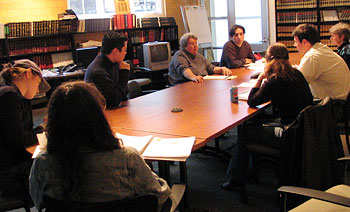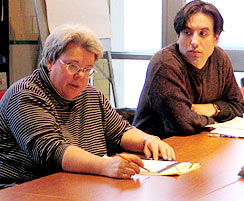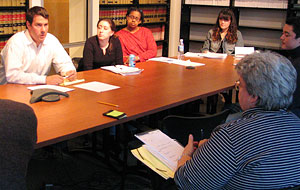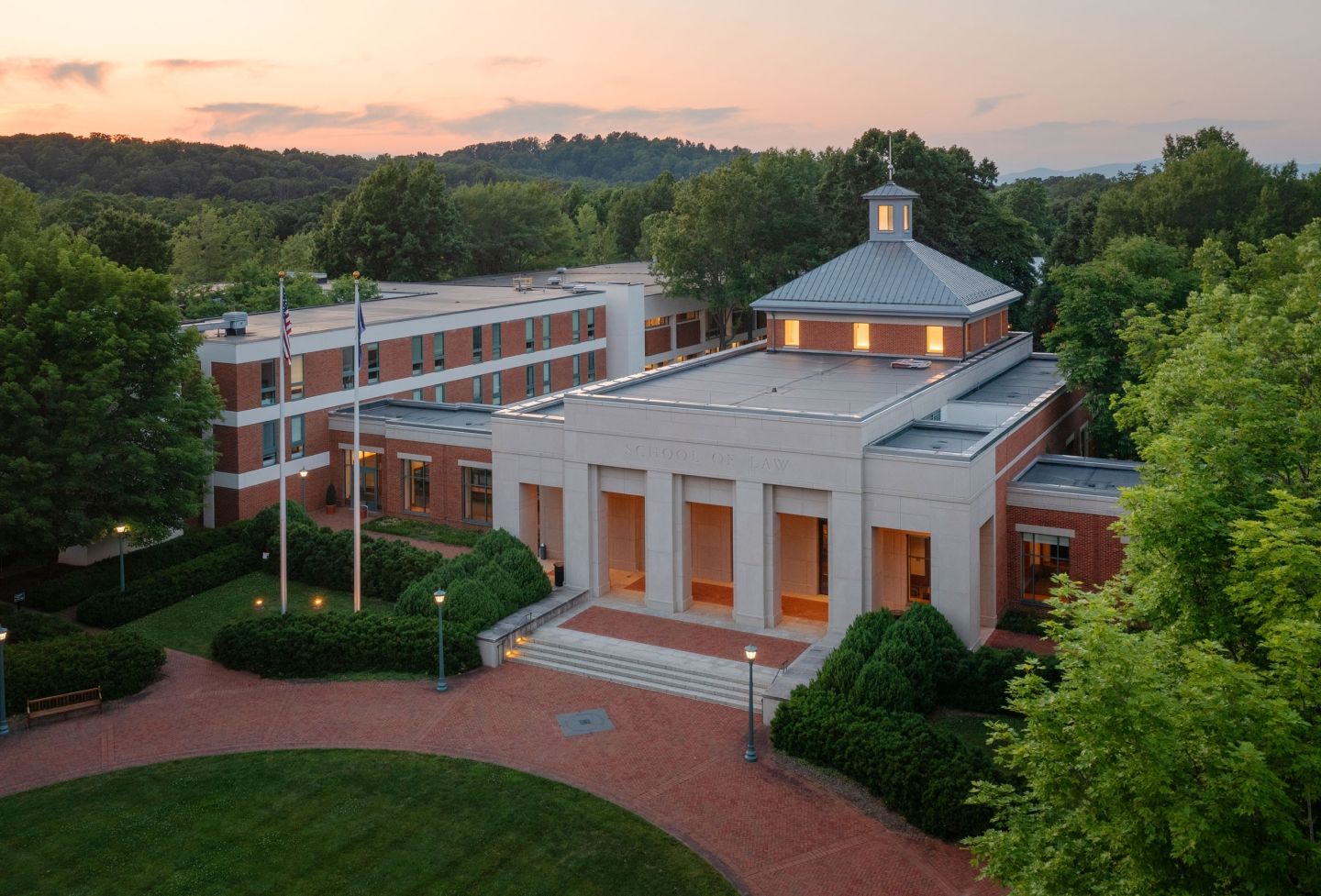Elder Law Clinic Addresses Broad Range of Legal Issues

Their clients are a vulnerable group and often overlooked by the community, but students taking the Advocacy Clinic for the Elderly found that in helping low-income seniors they tackled a range of legal problems offering a well-rounded practical education in law and pro bono service.
"It's a great way to serve an underserved population first and secondly it's a fantastic way to learn," said clinic student Kristiana Brugger. "From being an adviser, to drafting transactional documents, you really get the gamut… It really lets [students] do pretty much any kind of case that they want."
In the clinic's first year, the seven students in the year-long course drafted wills, powers of attorney, and advance medical directives. They also worked on administrative appeals on social security and Medicare benefits claims, Medicaid cases, and tax and property disputes. This spring, students paired up to make a series of educational presentations to area seniors on the new Medicare prescription benefits, consumer protection and nursing home residents' rights, and trusts, wills, and powers of attorney.
Since many of the low-income seniors the students served were house-bound, students often paired up to make home visits.
"They're vulnerable to different kinds of exploitation and they're not in good positions to get out and get effective legal representation. They really do need it for a lot of things," said clinic student Jack Wilson, a philosophy professor on leave from Washington and Lee University. Ironically, clinic students are the ones getting out in the community as a result. "I've seen more this last year of the community than I have [the past three years] combined," said third-year law student Megan Davidson.
The students entered their clients' lives in some cases as they were close to dying. "We confronted death a lot, which is something I didn't necessarily expect," Davidson said. Having families let them in at such a time "has really been a privilege."

Students are guided by supervising attorney Claire Curry of the Charlottesville-based Legal Aid Justice Center, which offers civil legal services to low-income families throughout Central Virginia and to low-wage immigrant workers statewide. At the Center, Curry works with the elderly population and also represents the Public Housing Association of Residents. The School of Law received a two-year start-up grant to run the clinic from the Jessie Ball DuPont Fund and the Virginia Law Foundation, due to the efforts of Virginia alum Lora Hamp '02, who co-taught the clinic during the first semester. She has since handed administrative duties to April Holmes, who previously coordinated the 2020 Community Plan on Aging, a collaborative effort spearheaded by the Jefferson Area Board for Aging (JABA). Clinic students also worked with such partners as JABA and the Senior Center, Inc. Other planned projects will be coordinated with the Virginia Elder Rights Coalition and the Senior Lawyers Division of the American Bar Association.
Hamp and law professor Richard Bonnie designed the clinic to expand practical opportunities for students and to help fill out the Health Law Program offerings, which also include courses on Aging and the Law and the Mental Health Law Clinic.
Bonnie said he is excited about the clinic and the overall program in law and aging.

"We have a chance to do some very interesting and innovative things involving the Medical School-which is developing great strengths in geriatrics-and the community," Bonnie said. "This will spawn research opportunities as well as educational ones." Bonnie and Dr. Suzanne Holroyd, a geriatric psychiatrist, are working on a research study involving the competence of people with dementia to vote, which will yield further advocacy opportunities for students. Bonnie said he and the clinic's instructors hope to expand the course next year so that more students can enroll.
The growing number of seniors in the area, due in part to the graying baby-boom population and the popularity of the city as a retirement hotspot, suggests the need for such services will only increase.
"We have a large number of cases with people in very dire situations," supervising attorney Curry said. The clinic offered a good opportunity for law students to work directly with clients and expand what the Legal Aid Justice Center could offer. "It exceeded my expectations in terms of the students actually getting out there and going to see the clients who physically could not come to Charlottesville," she said.
In addition to Charlottesville, the clinic serves Albemarle and surrounding counties Fluvanna, Greene, Nelson, and Louisa. "I lived here before I came to law school so it's nice to go into communities that I haven't been exposed to," Wilson said. "It's a great chance to help an underserved community and get great experience in practical lawyering along the way."
Students meet for a two-hour session each week to discuss the cases they are working on. Clients are often referred through outreach workers, social services, or relatives, although some are walk-ins. The clinic has had guest speakers, such as attorneys from the law firm McGuire Woods, who talked about trusts and estates. "It provides for an informal atmosphere too," Brugger said. "We really get maximum access to our instructors." Brugger worked about eight to10 hours on clinic work each week, including calling clients, researching, writing memos or updating memos, and sometimes spending hours on the phone trying to get clients social security benefits.
After taking the clinic, third-year law student Kathleen Zvarych chose to start her legal career at the nonprofit Council for Senior Centers in New York City, where she received a fellowship. The clinic "definitely contributed to them offering the job."
Students had varying reasons for taking the course. Jennifer Banner said she often thinks about elder-care issues because her parents are older. "It's important to me that people help older people in this countryâ¦that they're treated with the respect that they deserve," she said. Banner called one trip the class took to Westminster Canterbury Nursing Home on Pantops Mountain an "amazing experience." The University's head of geriatrics, Dr. Mark Williams, showed them the different levels of care, from able-bodied seniors to those on ventilators.
"It's really different from anything else you're going to do in law school," Wilson said.
While giving a presentation about the new Medicare bill to well-informed seniors in Greene County, Brugger said she "was really surprised to see how opinionated our audience was on one viewpoint or another." Curry herself was surprised. "I thought we were going to have an AARP card burning," she said, adding that it brought home the dire situation seniors face with expensive prescription drugs. ( view a handout from the student presentation about the revisions to the Medicare Act )
Curry said the clinic has likely been an eye-opening experience for students. "I think they'll probably take more seriously their pro bono obligations," Curry said. "It's a privilege to practice law."
Although cases varied each week, Curry said they tried to ensure each student got direct experience in trusts and estates, which includes work such as writing a will, and counseling clients about powers of attorney and advance medical directives. Students without their third-year practice certificates had the opportunity to advocate for clients at administrative hearings. Such cases can include those before the Social Security Administration, which can focus on whether clients received the correct amount of benefits or whether they were overpaid, whether the client was at fault in getting the higher payment, or whether they are able to re-pay overpayments. Other administrative cases might address veterans' benefits, food stamps, or fuel assistance, a program that helps low-income seniors with their heating bills.
Holmes, who is not a lawyer but coordinates with area senior advocacy groups, said she was "impressed with how complex the issues are that students are dealing with."
Some federal programs in particular can be intricate to wade through, Curry said. "The Medicaid cases can tend to be complicated because the laws and the regulations are so byzantine."
The students' presentation materials likely will be used in the future at informational presentations, and two students are also working on material for a brochure on administrative remedies for nursing home residents.
"I was very pleased with the students and what a contribution they can make," Curry said. "I think they have a great affinity and compassion for these folks."
Founded in 1819, the University of Virginia School of Law is the second-oldest continuously operating law school in the nation. Consistently ranked among the top law schools, Virginia is a world-renowned training ground for distinguished lawyers and public servants, instilling in them a commitment to leadership, integrity and community service.


